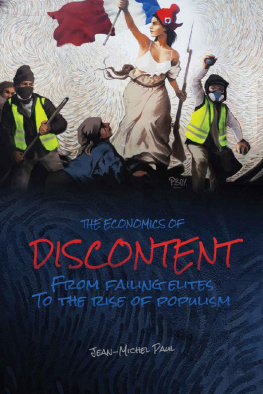THE ECONOMICS OF DISCONTENT
THE ECONOMICS OF DISCONTENT
by Jean-Michel Paul
eBook Formatting and Cover Design by FormattingExperts.com
Book cover art: mural by Pascal Boyart (pboy-art.com)
Paperback ISBN 978-981-14-1730-6
This book has no royalties or copyright. Feel free to quote, copy and share. If you wish to show your appreciation for this book I cannot think of a better way than by supporting the twin pillars of education and research.
I have the privilege to be associated with two particularly fine initiatives in my alma mater, the Universit libre de Bruxelles in Belgium, of which I am particularly proud. Any donation, whatever the amount, is much appreciated.
The postgraduate finance programme in which I teach, helping bright candidates coming from around the world but who lack sufficient financial means to enroll (Advanced Master in Financial Markets programme, https://am.solvay.edu/financial-markets-4-2/)
Solvay Brussels School of Economics and Management, Avenue Franklin D. Roosevelt 50, CP 114/01, 1050 Brussels, Belgium IBAN: BE56 7320 5060 8688, BIC: CREGBEBB; Communication: I support students in need.
The public utility research foundation that supports the most promising researchers of the ULB (Fondation ULB, www.fondation.ulb.ac.be)
Fondation ULB Fondation dUtilit Publique, Avenue Franklin D. Roosevelt 50, CP129, 1050 Brussels, Belgium IBAN: BE95 3630 4292 4358, BIC: BBRUBEBB; Communication: I support research.
Do you want to support the art of Pascal Boyart? Just scan the QR code using a smartphone with a Bitcoin wallet to send BTC donations to his address: 3Pboy9ucGEdQUHNu2rrC6RGq4jouRc4Grb. Donations in Bitcoin and other crypto-currencies allow the artist to keep all independence in his creations and free himself from intermediaries (galleries, art dealers, institutions). The public can thus provide support to help fund the future works.
CONTENTS
I: PAIN AND WEALTH:
A DEEPENING RIFT
EBOOK EDITION NOTE
If you are using a device with auto-rotation of screen orientation, it is best to disable this option while reading this book. Landscape figures are rotated by 90 degrees to maximize screen use and you will need to rotate the device to look at them. When auto-rotation is in use, as soon as you rotate the screen, the image would also rotate to reflect the new device orientation. Depending on your device, you will either need to disable auto-orientation or enable orientation lock for the best reading experience.
Special thanks for the help and assistance of Dr. Samir Dutt, Giovanni Quaranta, Therese Raphael, Ben Schreckinger, Jeanette Yeo and Formatting Experts team.
To Alexandre and Jean-Sebastien. Remember that with ability and privilege come responsibility and sacrifice.
I am one of the lucky ones. The forces of globalization have been very good to me. By all reasonable standards in an increasingly unreasonable world, I am privileged and well-off. I have the pride to believe that I earned it through hard work, but also the humility to recognize I was offered opportunities along the way that have allowed me to have come from a humble background to leading this life.
When I travel and visit my less well-off family in Belgium, Spain or Switzerland, far from the fancy neighborhoods of our insanely expensive capitals, living from pay check to pay check in run-down dwellings or semi-permanent trailer parks, my heart sinks. In places like these, all over the developed world, hidden from the spotlights, even the hope of the younger generation has been taken away. They have been clubbed down under exploding student debt and neglected by a general lack of state investment, condemned to become white trash. Unintegrated minorities are not doing any better. Collectively they form an underpaid renter generation forced to live with their parents rather than change the world.
This is the result of the self-serving policies of a ruling class that is no longer, but for rare exceptions, the best among us, of a leadership vacuum that feeds ever growing levels of dysfunction. A majority of increasingly incompetent and corrupt Western leaders, publicly scrutinized for their private sex lives rather than their ability to govern, keep selling out the future, granting extraordinary rights and privileges to a few rent extractors at the expense of the many. Blinded by greed, the ruling elite, ignoring the common good, fails to even recognize the resulting cost and pain.
We have reached a tipping point. The implosion of our political system and societies has become all too real a possibility, if not the likely outcome. The derided dissenters, now immune to elite opprobrium, have started to publicly express an unarticulated nationalist anger, surprising even themselves by their audacity to challenge the established order and discovering, in the process, that they are the majority. Yet this volatile rejection of the status quo has so far been unable to produce cohesive rational solutions and could ultimately make things worse.
I believe the populist insurgents, contrary to the impression given by prevailing media coverage, are largely correct about what has gone wrong, but, dangerously, know far less about how to make it right. I believe we should listen respectfully, to acknowledge that the populists have a valid point, that they are not just simpletons nor backwards, racist xenophobes. I believe it is time to reflect on what policies would restore some necessary balance, a renewed role for core government and a renegotiated, reinvigorated, social contract.
I
PAIN AND WEALTH:
A DEEPENING RIFT
INTRODUCTION:
THE NEXT CRISIS
ACKNOWLEDGING THE MAJORITYS PAIN
Do you hear the people sing? Singing the song of angry men? (Les Miserables)
By gaining the people, the kingdom is gained, and, by losing the people, the kingdom is lost. (Confucius)
WE ARE ECONOMICALLY, POLITICALLY, AND INTELLECTUALLY UNPREPARED FOR THE IMPENDING NEXT CRISIS
NO NEW COHERENT POLICY IS POSSIBLE WITHOUT ACKNOWLEDGING THIS
POPULISM IS A RATIONAL REACTION
A NEW SOCIAL CONTRACT IS NEEDED
The next crisis is coming. It will be a severe downturn for which we are unprepared. Economically unprepared our traditional means of action, be it fiscal or monetary policy, are no longer effective or available. Politically unprepared we are left with a fragmented political system where the dissenters to a broken social contract are now an emerging majority that is unable to articulate a set of rational policies. But worst of all, we are intellectually unprepared. For we have no coherent understanding of Western societies deep sources of frustration. It is high time for the developed worlds elites to shred the veil of denial, to confront the facts, to have the courage to hear the complaints of the majority of dissenters, to dare to speak out and act. For the next crisis is coming, and there is little time left to make sure it wont turn into a full-blown political meltdown.
We are facing the failure of Western elite.
The seeds of todays unsustainable social pressure making the world not only more unfair, but the future more hopeless.
Faced with the growing pain, but unwilling to tackle its causes, successive governments across the developed world have used and abused fiscal policy to buy political relief. Inflated and unfinanced social spending bought temporary social peace and votes, but progressively rendered the state powerless and indebted. With little fiscal room to maneuver, monetary policy eventually became the only game left in town. But propping up asset prices with interest rate cuts systematically enriched a few, reflated burst bubbles, promoted speculation and encouraged moral hazard. Eventually, even monetary policy became inadequate. In response to the last crisis, we took a leap into the unknown, embracing untried quantitative easing policies and kicking the can of economic problems down the road to the next recession. In the process we became addicted to easy, seemingly costless money. But quantitative easing has arbitrarily compounded the assets of the wealthiest, breaching our social contract. Though few yet recognize it, mishandled quantitative easing will someday detonate decades of accumulated social-economic discontents.








